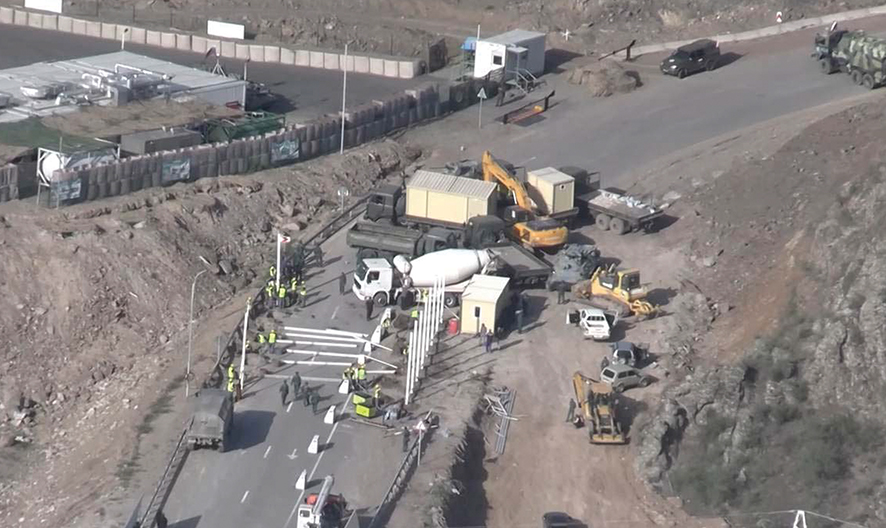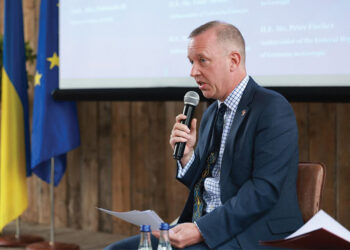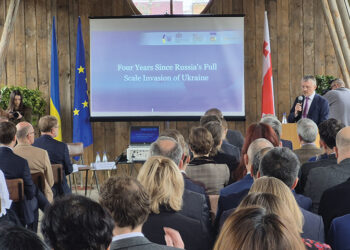Russia’s almost 2,000 soldiers serving in a peacekeeping role in the tenuous Nagorno-Karabakh region are taking steps to quell the recent spat of violence that has rocked the area. The latest move is the incoming of a new commanding officer. According to sources inside the Russian Ministry of Defense, this is Colonel-General Alexander Lentsov.
Lentsov is the fifth commander to have rotated out of the role, coming from a post as advisor to Minister of Defense Sergei Shoigu. He served in the soviet military in Afghanistan, in both the First and Second Chechen Wars, as well as in combat operations in Syria. However, he has not been deployed to Ukraine since 2015.
Interestingly, this change of command comes after an incident between Azerbaijani and Russian troops over the construction of a new border control station along the Lachin Corridor. The new checkpoint is in an area still considered very tense by all sides involved, as it is the primary road connecting Armenia and the Yerevan-backed Republic of Artsakh. While Russian peacekeepers stayed calm, they reportedly actively discouraged Azerbaijani leaders on the ground from completing the structure.
Despite their attempts, Azerbaijani border guards released a video on social media “delivering” the new territory along the border to President Ilham Aliyev. In response, Armenian and Artsakh officials released statements in outrage. Artsakh Foreign Minister Sergey Ghazaryan even commented that his largely unrecognized government “expects active steps from the Russian side” in response to this transgression by Baku.
All of this comes after a string of clashes between Armenian and Azerbaijani troops that left seven killed and an unconfirmed number wounded. Earlier this month, both sides accused the other of provocations that resulted in significant firefights just to the west of the Lachin Corridor. Days prior to this, Azerbaijani troops were reported to have secured additional positions along heights near the road that leads to the Yerevan-backed capital of Artsakh, Stepanakert.
The additional bloodshed has likely led to Moscow wanting to double down in the region. With its forces bogged down in Ukraine, and awaiting a much anticipated Ukrainian offensive, Kremlin commanders are unwilling to have another problem on their plate. As a result, the appointment of this new commander may signal an attempt by Russia to begin to act more decisively to curtail the recurrent violence.
Already, Armenian and Artsakh authorities have called for just this from Lentsov. Samvel Babayan, politician and former Minister of Defense of Artsakh, asked the incoming general to prove his worth by shutting down the checkpoint. “Now let’s see how much they will be able to prevent this circus from continuing,” Babayan commented on local television.
While the measures the new commander is willing to go to have yet to be seen, the calls for action are likely to encourage him to take more aggressive steps. Russian forces entered the region in 2020 under their “MC” peacekeeping banner following the 44-day war that ended with a victory for Baku. Since then, both sides have accused the peacekeeping contingent, largely consisting of the 15th Separate Guards Motorized Rifle (Peacekeeping) Brigade, of aiding the other side or being too inactive altogether.

Armenia has widely accused them of being in league with Azerbaijan, allowing them to conduct maneuvers and take more territory. Baku has claimed Russian troops were protecting and aiding Armenian arms shipments into the region to support Artsakh Defense Forces and other armed groups. As such, the peacekeeping command staff have been stuck in a sort of tug-of-war, attempting to avoid the unit in a three-way shootout.
Lentsov is likely a protective measure. Only he and his staff know their orders, but with the invasion in Ukraine stalled and most international analysts claiming the war is entering a critical all-or-nothing phase, Moscow has most probably tasked him to ensure peace whatever the cost. Baku, sensing the blood in the water that is Russian martial weakness from Ukraine, has notably been more proactive in its movements.
Open-source intelligence sources have abounded with reports and satellite images showing Azerbaijani air assets being moved to airfields in the west and south of the country. Additional heavy equipment in the form of artillery and armored vehicles has been recorded moving into the region in advance of potential hostilities. Baku has also stood up staunchly to Iran, a nation that has vowed to act if there is any attempt to change the borders in Nagorno-Karabakh.
Were all this to boil over into another larger, and more deadly, version of the 2020 Karabakh War, Russia would likely be obligated to invest. With active military bases in Armenia, Russia has to enter, and if Turkey supports, or even enters on the side of Azerbaijan, it does not take advanced geopolitics degrees to see where this takes Moscow. Fighting two resource-intensive wars would shatter the Kremlin, spell the end of Russian President Vladimir Putin’s rule, and most likely send Russia back to the 1990s.
As such, there is a lot of weight on Lentsov’s shoulders. It is a big request to ask a general to keep a powder keg like the South Caucasus off a war footing. To do this, it is likely we will see Russia’s peacekeeping troops take a higher profile role in stopping aggression, regardless of which side one wishes to blame. However, there remains one issue: what is the limit?
While there have been no clear ‘red lines’ set forth by Moscow, the aforementioned stakes could raise that line fairly high. Russian troops, as seen in Ukraine, Syria, and Georgia, are not known for their discretion and calm temperament. With most eyes on the upcoming counteroffensive by Kyiv against Russia, it would be wise to keep one keen eye on Nagorno-Karabakh too.
By Michael Godwin














